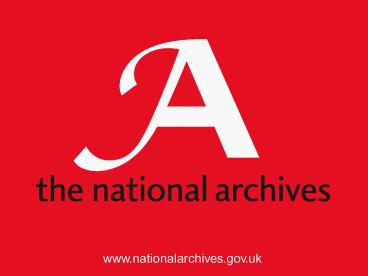EU Internet GatewayPortal - PowerPoint PPT Presentation
1 / 14
Title:
EU Internet GatewayPortal
Description:
Review the purpose and structure of the proposed gateway ... Sharing of expertise, skills and best practise. Offline. Finding Aids. Online. Finding Aids ... – PowerPoint PPT presentation
Number of Views:39
Avg rating:3.0/5.0
Title: EU Internet GatewayPortal
1
(No Transcript)
2
EU Internet Gateway/Portal
- Bill Stockting
- the National Archives (TNA)
- European Board of National Archivists (EBNA)
- Kew, 17 November 2005
3
Introduction
- Priority Action 3 of report on Archives in the
Enlarged European Union proposes an - Internet gateway to documents and archives for
European citizens - I will
- Review the purpose and structure of the proposed
gateway - Discuss issues relating to the development of
international Internet gateways by reference to
recent professional developments
4
Why a European gateway for archives?
- The report calls for a central access point to
all published archival descriptive information in
the form of a gateway with benefits for the - Public
- Democratise access to archival information across
Europe - Enhance learning about European history and
culture - Professionals
- Enable co-ordinated working
- Sharing of expertise, skills and best practise
5
Central Union Finding Aid (Cross searching
with links to national/ local services and
digitized images of archives)
Links to other online resources databases,
websites
Offline Finding Aids
Online Finding Aids
Union Finding Aid
References to printed finding aids and
resources
6
Tools for users incl.e-learning How to read
archives etc.
Offline Findig Aids
Online Finding Aids
Union Finding Aid
Galleries of Digital images of significant histor
ical documents
General information on repositories (opening
hours, location maps etc.)
7
RLG International Archival Gateways Meeting
- 2 days of discussion organised by RLG, hosted by
the National Archives at Kew in May 2005 - Representatives from France, Germany, the
Netherlands, Poland, Sweden, UK and U.S. - Reviewed current programmes
- Discussed nature of interoperability and issues
of the development of gateways in an
international context
8
The importance of the user
- The meeting agreed that a gateway service must be
clear who its users are - Provide those users with a good quality service
- Academic work on use of online archival systems
now backed up with focussed user evaluation both
before and after service launch online - Also European work in wider cultural heritage
sphere such as the Minerva and Calimera
programmes
9
Standards descriptive
- The archives ISAD(G)
- The context ISAAR(CPF)
- Archive repositories standards in development
10
Standards technical
- XML data structure standards allow the online
presentation and interoperability of archival
data, discussed at workshop as part of the
Bundesarchivs ltdaofindgt project in May 2005 - The archives Encoded Archival Description (EAD)
- The context Encoded Archival Context (EAC)
- Archive repositories Encoded Archival Guide
(EAG) - Digital images Metadata Encoding and
Transmission Standard (METS)
11
Content Creation
- The proposed union finding aid and virtual
reading room of the gateway demand digital
finding aids and versions of the archives - Mass retroconversion programmes such Access to
Archives (A2A) in UK - Many cataloguing databases or XML based systems
- Much experience of digitisation and guidance in
process developed by Minerva guidelines for
example
12
Technical architecture
- The RLG meeting also looked at the architecture
of gateway systems and the relationship between
those that create content and those who provide
online gateways - Preference for distributed systems where central
service gains access to metadata created and
managed by archive institutions - Standards and protocols for connection such as
Z39.50, XML based web services or OAI as used in
the European Library (TEL) launched in 2005 for
example
13
Business issues
- While, technical developments then make the
development of the proposed gateway possible, the
RLG meeting noted business issues that remain
unresolved - Culture and language
- Leadership and partnership
- Funding
- Content creation
- Development
- To sustain a viable and popular service
14
(No Transcript)































